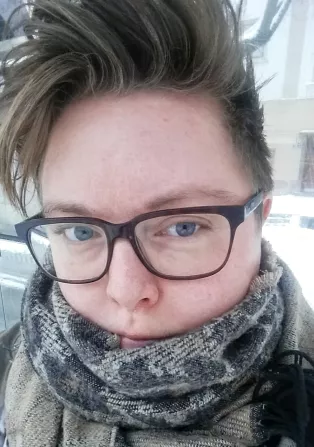NordiQueer – A Nordic Queer Revolution?
HOW DID DIFFERENT FORMS OF QUEER ACTIVISM INFLUENCE THE NORDIC WELFARE STATES SINCE THE EARLY 1950s? WHAT CHANGES IN GENDER, SEXUALITY AND GENDER EXPRESSION DEFINE CONTEMPORARY SCANDINAVIAN SOCIETIES AND WHAT ARE THEIR ROOTS?
Funded by the Swedish Research Council (Vetenskapsrådet)
In progress 2019–2022
The project will result in a comprehensive history of gay, lesbian, bisexual, queer, trans, and intersex (LGBTQI) activism in Denmark, Norway, and Sweden 1948–2018. We want to examine the complex historical-social reasons why conditions of life have improved for LGBTQI communities in Scandinavia, while considerable inequalities remain – and to some extent are reported to grow.
How, when, and to what degree have Scandinavian welfare-states cooperated with the LGBTQI movements? What place did women have in activist work and how did lesbian feminists interact with mainstream feminist movements? What role did trans activists play in the formation of Scandinavian LGBTQI activism? And how did LGBTQI activists handle tensions between respectability and diversity?
Previous research has focused on narrow national perspectives, but this project intends to write a comprehensive transnational history of Scandinavian LGBTQI activism in the expanding welfare states. In addition, it aims to analyse the complex relationship between sexuality and gender expression and study the historical background to today's increased focus on trans- and intersex activism.
Research Group
Professor Jens Rydström, project coordinator, Lund University, and Professor Tone Hellesund, University of Bergen, will contribute with their expertise on an overarching level, while one researcher in each country will investigate one specific aspect of the project: National homophile or gay/lesbian organisations (Peter Edelberg, University of Copenhagen); Women in activism (Elisabeth Lund Engebretsen, University of Stavanger and Erika Eidslott, University of Stavanger and University of Bergen); and finally Trans activism (Signe Bremer Gagnesjö, Lund University). PhD-student Nico Miscow Friberg in Stavanger will investigate trans*organising in Denmark after 1990. The strength of the project is the close cooperation between the researchers, so that each aspect will be investigated from three national perspectives. This, in turn, will result in a comprehensive Scandinavian LGBTQI history.
Project Coordinator
Jens Rydström
Jens Rydström is Professor in Gender Studies and Associate Professor in History. His research revolves around the history of sexuality, critical disability research, Queer Theory and Crip Theory. He is currently investigating the history of the AIDS epidemic and civil society in Sweden and the history of sex workers’ organisations in Scandinavia.
E-mail: jens [dot] rydstrom [at] genus [dot] lu [dot] se (jens[dot]rydstrom[at]genus[dot]lu[dot]se)
Website: https://www.gender.lu.se/jens-rydstrom
Tone Hellesund
Tone Hellesund is a Professor of Ethnology at the University of Bergen and Director of the Queer Archives at the same university. Among other things she has carried out research on romantic friendships between women 1880–1940, single life and couple normativity, lesbian activists in the 1970s, and gay and lesbian identities and suicide narratives.
E-mail: Tone [dot] Hellesund [at] uib [dot] no (Tone[dot]Hellesund[at]uib[dot]no)
Website: https://www.uib.no/en/persons/Tone.Hellesund
Website of the Queer Archives: https://skeivtarkiv.no/en
Interrogating the Scandinavian LGBT Movement: Transnational and Comparative Perspectives
Peter Edelberg
Peter Edelberg holds a PhD in history and works as a lecturer (lektor) at the Saxo Institute at Copenhagen University. His doctoral dissertation investigated the policing of gay men in Denmark after World War Two. He has since carried out research in historical method and the theory of history and published articles on many different aspects of the Danish history of sexuality.
E-mail: edelberg [at] hum [dot] ku [dot] dk (edelberg[at]hum[dot]ku[dot]dk)
Beyond Equality: Women’s Sexual-Justice Politics in Scandinavian Queer Organising
Elisabeth Lund Engebretsen
Elisabeth Lund Engebretsen has a PhD in Social Anthropology and is Associate Professor (førsteamanuensis) at the Network for Gender Studies at the University of Stavanger. Her research focuses on transnational gender and sexual diversities with a special focus on China, and over the past few years has also focused on the Nordic region. She has focused on women’s norm-challenging life strategies, queer kinship and social movements.
E-mail: elisabeth [dot] l [dot] engebretsen [at] uis [dot] no (elisabeth[dot]l[dot]engebretsen[at]uis[dot]no)
Website: https://www.uis.no/en/profile/700
Dreaming Trans Revolutions: Memories, Meeting Places and Activism in the Formation of Scandinavian Trans Rights Movements
Signe Bremer Gagnesjö
Signe Bremer Gagnesjö holds a PhD in Ethnology and has a background in ethnographic Trans Studies with an emphasis on trans experiences of gender-confirming healthcare and urban space. Previous research involves themes such as transphobic violence in public spaces, waiting in medical settings, forced sterilisation, public transport as precarious space, trans experiences of feminist spaces, and intersections between cisnormativity and racialization.
E-mail: signe [dot] bremer [at] genus [dot] lu [dot] se (signe[dot]bremer[at]genus[dot]lu[dot]se)
Confronting fantasies of Scandinavian progressiveness and queer utopia - Queer and trans organising in Denmark since 1990
Nico Miskow Friborg
Nico is a PhD candidate at the Centre for Gender Studies at the University of Stavanger and co-founder of TransAktion – an organization for and by trans people in Denmark. Their research focuses on queer and trans organising in a – primarily – Danish context, social movments and the NGO Industrial Complex as well as access to transspecific healthcare. Their work is anchored in community-based research and collaborative ethnography.
E-mail: nico [dot] m [dot] friborg [at] uis [dot] no (nico[dot]m[dot]friborg[at]uis[dot]no)








